|
Dusty Dog Reviews The whole project is hip, anti-academic, the poetry of reluctant grown-ups, picking noses in church. An enjoyable romp! Though also serious. |
|
Nick DiSpoldo, Small Press Review (on Children, Churches and Daddies, April 1997) Children, Churches and Daddies is eclectic, alive and is as contemporary as tomorrow’s news. |



|
Kenneth DiMaggio (on cc&d, April 2011) CC&D continues to have an edge with intelligence. It seems like a lot of poetry and small press publications are getting more conservative or just playing it too academically safe. Once in awhile I come across a self-advertized journal on the edge, but the problem is that some of the work just tries to shock you for the hell of it, and only ends up embarrassing you the reader. CC&D has a nice balance; [the] publication takes risks, but can thankfully take them without the juvenile attempt to shock. |
|
from Mike Brennan 12/07/11 I think you are one of the leaders in the indie presses right now and congrats on your dark greatness. |
Volume 229, February 2012
Internet ISSN 1555-1555, print ISSN 1068-5154
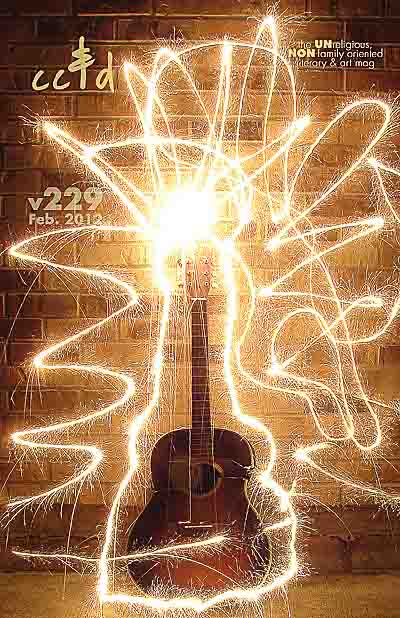
see what’s in this issue...
Note that in the print edition of cc&d magazine, all artwork within the pages of the book appear in black and white.
|
Order this issue from our printer as a a $7.67 paperback book (5.5" x 8.5") perfect-bound w/ b&w pages |

poetry
the passionate stuff
OptimistDan Fitzgerald
Been to a lot of funerals
|
| Janet Kuypers reads the Dan Fitzgerald poem Optimist from the 2/12 issue (v229) of cc&d magazine |

Watch the YouTube video of Kuypers reading this poem at the open mike 2/1/12 at Gallery Cabaret’s the Café Gallery in Chicago |
our lady of humility’s hypocrisyJanet Kuypers05/18/11 saw hypocrisy in a bumper sticker today:
“Proud Parent of
Check out Janet Kuypers twitter-length poems
|
SurvivorMel Waldman
His buddies died. But he survived and
Doesn’t talk much now but his shriveled,
he tries to be normal, he fails, especially
The endless sand and wind sweep him back
His traumatized flesh shakes.
Tonight, he wanders in the streets, carrying a
|
BIOMel Waldman, Ph. D.Dr. Mel Waldman is a licensed New York State psychologist and a candidate in Psychoanalysis at the Center for Modern Psychoanalytic Studies (CMPS). He is also a poet, writer, artist, and singer/songwriter. After 9/11, he wrote 4 songs, including “Our Song,” which addresses the tragedy. His stories have appeared in numerous literary reviews and commercial magazines including HAPPY, SWEET ANNIE PRESS, CHILDREN, CHURCHES AND DADDIES and DOWN IN THE DIRT (SCARS PUBLICATIONS), NEW THOUGHT JOURNAL, THE BROOKLYN LITERARY REVIEW, HARDBOILED, HARDBOILED DETECTIVE, DETECTIVE STORY MAGAZINE, ESPIONAGE, and THE SAINT. He is a past winner of the literary GRADIVA AWARD in Psychoanalysis and was nominated for a PUSHCART PRIZE in literature. Periodically, he has given poetry and prose readings and has appeared on national T.V. and cable T.V. He is a member of Mystery Writers of America, Private Eye Writers of America, American Mensa, Ltd., and the American Psychological Association. He is currently working on a mystery novel inspired by Freud’s case studies. Who Killed the Heartbreak Kid?, a mystery novel, was published by iUniverse in February 2006. It can be purchased at www.iuniverse.com/bookstore/, www.bn.com, at /www.amazon.com, and other online bookstores or through local bookstores. Recently, some of his poems have appeared online in THE JERUSALEM POST. Dark Soul of the Millennium, a collection of plays and poetry, was published by World Audience, Inc. in January 2007. It can be purchased at www.worldaudience.org, www.bn.com, at /www.amazon.com, and other online bookstores or through local bookstores. A 7-volume short story collection was published by World Audience, Inc. in June 2007 and can also be purchased online at the above-mentioned sites. |
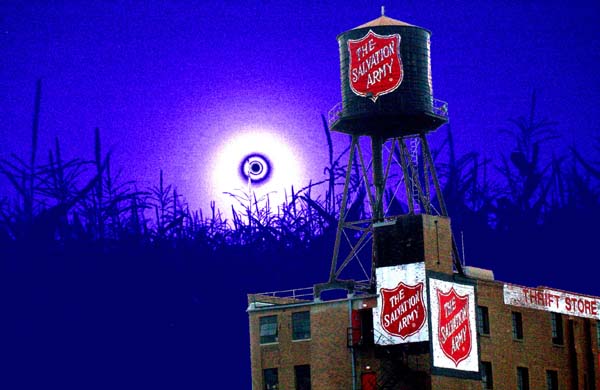
Salvation IV, art by Oz Hardwick
The Seven Deadly Colors: Goldfrom the series “The Seven Deadly Colors”;a series of seven poems originally published in The Lamp-Post. Bob Johnston
It is a comfort to know that I
|
The Seven Deadly Colors: Grayfrom the series “The Seven Deadly Colors”;a series of seven poems originally published in The Lamp-Post. Bob Johnston
The world outside my window is grimy
There is work to be done,
Two flies are trapped in a web
|
| Janet Kuypers reads the Bob Johnston poem the Seven Deadly Colors: Gray from the 2/12 issue (v229) of cc&d magazine |

Watch the YouTube video of Kuypers reading this poem at the open mike 2/1/12 at Gallery Cabaret’s the Café Gallery in Chicago |
Bob Johnston BioBob Johnston is a retired petroleum engineer and translator of Russian scientific literature. He waited until his sixtieth year to start writing fiction and poetry, and over the next thirty years he has been trying to catch up. He lives in the original Las Vegas, New Mexico with his wife, three cats, and some hope of completing his memoirs and the Great American Novel.
|
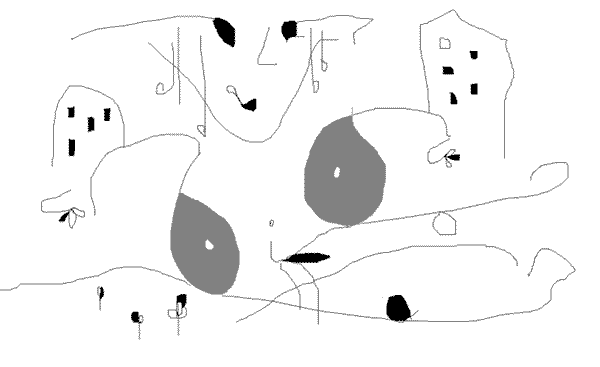
City Witch, art by the HA!man of South Africa
Poem from
Kenneth DiMaggio |
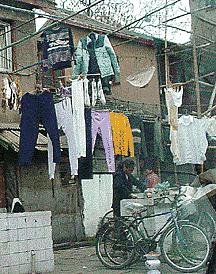
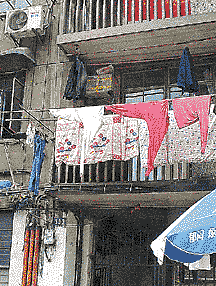
SignsJoseph Hart
The fools were holding placards
|
After Watching The Last Act Of “Don Carlos”Joseph Hart
The ultimate authority - The Church!
|
When Dick Cheney was our presidentFritz Hamilton
We’re at war with everybody.
We still think we police the world.
We’ve increased our efforts. Now add Libya.
The world still crumbles under Obama.
Shall we insert George W in there too?
?
|
Memorial Day 2011Fritz Hamilton
Memorial Day 2011,
& standing on the carrier to
& we’re in Afghanistan & Libya too,
We say we’ve won with 50,000 troops still there.
Like the Trojans saying they won & opening the horse,
All our wars remembered as horible, !
|
The Wisest Man in Oak ParkJacob Kreutzer
I walked up to
|
Jacob Kreutzer BioJacob Kreutzer is a young poet from Grand Island, NE. He is currently a student at Concordia University Chicago where he is majoring in Secondary Education. His work has previously appeared in Heavy Hands Ink, The Cynic, Daily Love, and numerous other publications.
|
| Janet Kuypers reads the Jacob Kreutzer poem the Wisest Man in Oak Park from the 2/12 issue (v229) of cc&d magazine |

Watch the YouTube video of Kuypers reading this poem at the open mike 2/1/12 at Gallery Cabaret’s the Café Gallery in Chicago |
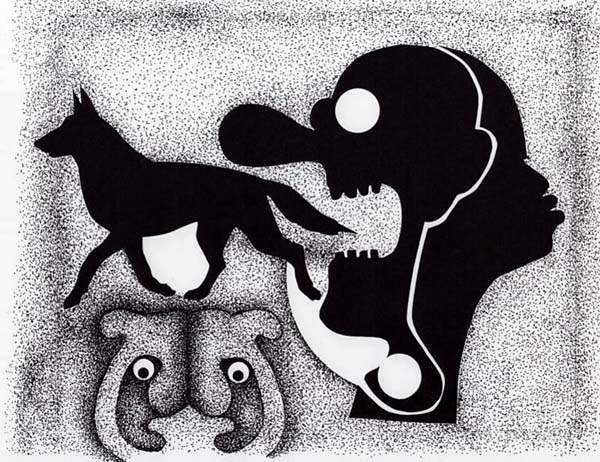
ART610KUC, art by Üzeyir Lokman ÇAYCI
Red Slice of MoonVirginia Fultz
I ran a splinter under my nail.
The hot cup of coffee is a comfort
|
About Virginia FultzA Merit Award in 2011 Atlanta Review International Poetry Competition Virginia was born in Shattuck, Oklahoma, grew up in Laurel, Mississippi, lived and taught English in El Paso, Texas, and California, where she earned two M.A.s in English literature, finally moving “home” to New Mexico. When not traveling, she and her husband Ed who have been together a wonderful long time, thrive on the clear air and stunning vistas from their home in the Sandia Mountains foothills in Albuquerque, NM. Virginia knows it’s true that happiness grows beautiful flowers, one pound tomatoes, and good friends.
|
PushedRiley Kean
You rode in the elevator with me
|
Leaden NecklaceMarcin Majkowski
A single blast
I come close
It’s still warm
Only a few
I’ll speed up
That’ll save
http://depechmaniac.bloog.pl http://satyrykon.net http://ateist-kleranty.deviantart.com/
|
WoundsEileen Troemel
The knife cuts deep – rending skin and tissue
Day after day the tissue melds back together
Do the edges really meld back together
Each day, month, year passes and you think
|
Before I can Put
Janet Kuypers |
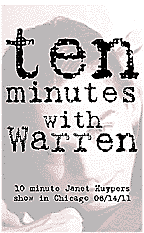

See this YouTube video listen: |

See this YouTube video with the Edge Detection filter, live 06/14/11 at the Café in Chicago |

See this YouTube video with the Sepia Tone filter, live 06/14/11 at the Café in Chicago |

See this YouTube video with the Film Age (older) filter, live 06/14/11 at the Café in Chicago |

See this YouTube video with the Threshold filter, live 06/14/11 at the Café in Chicago |
 See YouTube video of Kuypers’ feature Ten Minutes With Warren at the 06/14/11 open mic at the Café in Chicago, of her poems The Things Warren Says, No One Will, Warren Stories, Before I Can Put a Smile on my Face Again, It’s Someone’s Job, and You Carried It, & her covering the Eurythmics song I Need you, + her MFV song What We Need In Life
See YouTube video of Kuypers’ feature Ten Minutes With Warren at the 06/14/11 open mic at the Café in Chicago, of her poems The Things Warren Says, No One Will, Warren Stories, Before I Can Put a Smile on my Face Again, It’s Someone’s Job, and You Carried It, & her covering the Eurythmics song I Need you, + her MFV song What We Need In Life
|
 See YouTube video from camera #2 of Kuypers’ feature Ten Minutes With Warren at the 06/14/11 open mic at the Café in Chicago, of her poems The Things Warren Says, No One Will, Warren Stories, Before I Can Put a Smile on my Face Again, It’s Someone’s Job, and You Carried It, & her covering the Eurythmics song I Need you, + her MFV song What We Need In Life
See YouTube video from camera #2 of Kuypers’ feature Ten Minutes With Warren at the 06/14/11 open mic at the Café in Chicago, of her poems The Things Warren Says, No One Will, Warren Stories, Before I Can Put a Smile on my Face Again, It’s Someone’s Job, and You Carried It, & her covering the Eurythmics song I Need you, + her MFV song What We Need In Life
|
 See YouTube video from the intro to the 06/14/11 open mic at the Café in Chicago, & Kuypers’ poems The Things Warren Says, No One Will, Warren Stories, Before I Can Put a Smile on my Face Again, It’s Someone’s Job, and You Carried It, & her covering the Eurythmics’ I Need you, + her MFV song What We Need In Life
See YouTube video from the intro to the 06/14/11 open mic at the Café in Chicago, & Kuypers’ poems The Things Warren Says, No One Will, Warren Stories, Before I Can Put a Smile on my Face Again, It’s Someone’s Job, and You Carried It, & her covering the Eurythmics’ I Need you, + her MFV song What We Need In Life
|
It’s Someone’s JobJanet Kuypers06/10/11
it’s someone’s job
it’s someone’s job
it’s someone’s job
it’s someone’s job
it’s not my job
it’s not fair is also on your nails
it’s not right
it’s not the way you lived
it’s someone’s job
it’s someone’s job what your body has become
it’s someone’s job we can’t cope with your dying
|
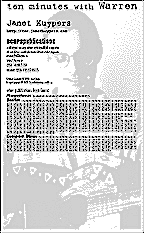

See this YouTube video listen: |

See this YouTube video with the Edge Detection filter, live 06/14/11 at the Café in Chicago |

See this YouTube video with the Sepia Tone filter, live 06/14/11 at the Café in Chicago |

See this YouTube video with the Film Age (older) filter, live 06/14/11 at the Café in Chicago |

See this YouTube video with the Threshold filter, live 06/14/11 at the Café in Chicago |
 See YouTube video of Kuypers’ feature Ten Minutes With Warren at the 06/14/11 open mic at the Café in Chicago, of her poems The Things Warren Says, No One Will, Warren Stories, Before I Can Put a Smile on my Face Again, It’s Someone’s Job, and You Carried It, & her covering the Eurythmics song I Need you, + her MFV song What We Need In Life
See YouTube video of Kuypers’ feature Ten Minutes With Warren at the 06/14/11 open mic at the Café in Chicago, of her poems The Things Warren Says, No One Will, Warren Stories, Before I Can Put a Smile on my Face Again, It’s Someone’s Job, and You Carried It, & her covering the Eurythmics song I Need you, + her MFV song What We Need In Life
|
 See YouTube video from camera #2 of Kuypers’ feature Ten Minutes With Warren at the 06/14/11 open mic at the Café in Chicago, of her poems The Things Warren Says, No One Will, Warren Stories, Before I Can Put a Smile on my Face Again, It’s Someone’s Job, and You Carried It, & her covering the Eurythmics song I Need you, + her MFV song What We Need In Life
See YouTube video from camera #2 of Kuypers’ feature Ten Minutes With Warren at the 06/14/11 open mic at the Café in Chicago, of her poems The Things Warren Says, No One Will, Warren Stories, Before I Can Put a Smile on my Face Again, It’s Someone’s Job, and You Carried It, & her covering the Eurythmics song I Need you, + her MFV song What We Need In Life
|
 See YouTube video from the intro to the 06/14/11 open mic at the Café in Chicago, & Kuypers’ poems The Things Warren Says, No One Will, Warren Stories, Before I Can Put a Smile on my Face Again, It’s Someone’s Job, and You Carried It, & her covering the Eurythmics’ I Need you, + her MFV song What We Need In Life
See YouTube video from the intro to the 06/14/11 open mic at the Café in Chicago, & Kuypers’ poems The Things Warren Says, No One Will, Warren Stories, Before I Can Put a Smile on my Face Again, It’s Someone’s Job, and You Carried It, & her covering the Eurythmics’ I Need you, + her MFV song What We Need In Life
|
You Carried ItJanet Kuypers06/10/11
the priest said
Jesus carried that cross
as that cross became heavier and heavier
you never forsook the ones
you never spoke to me of the pain
for months, you could no longer
you spoke only light-heartedly
and how you made people love,
that with you, like our teacher, like out friend because you were a part of it
|


See this YouTube video listen: |

See this YouTube video with the Edge Detection filter, live 06/14/11 at the Café in Chicago |

See this YouTube video with the Sepia Tone filter, live 06/14/11 at the Café in Chicago |

See this YouTube video with the Film Age (older) filter, live 06/14/11 at the Café in Chicago |

See this YouTube video with the Threshold filter, live 06/14/11 at the Café in Chicago |
 See YouTube video of Kuypers’ feature Ten Minutes With Warren at the 06/14/11 open mic at the Café in Chicago, of her poems The Things Warren Says, No One Will, Warren Stories, Before I Can Put a Smile on my Face Again, It’s Someone’s Job, and You Carried It, & her covering the Eurythmics song I Need you, + her MFV song What We Need In Life
See YouTube video of Kuypers’ feature Ten Minutes With Warren at the 06/14/11 open mic at the Café in Chicago, of her poems The Things Warren Says, No One Will, Warren Stories, Before I Can Put a Smile on my Face Again, It’s Someone’s Job, and You Carried It, & her covering the Eurythmics song I Need you, + her MFV song What We Need In Life
|
 See YouTube video from camera #2 of Kuypers’ feature Ten Minutes With Warren at the 06/14/11 open mic at the Café in Chicago, of her poems The Things Warren Says, No One Will, Warren Stories, Before I Can Put a Smile on my Face Again, It’s Someone’s Job, and You Carried It, & her covering the Eurythmics song I Need you, + her MFV song What We Need In Life
See YouTube video from camera #2 of Kuypers’ feature Ten Minutes With Warren at the 06/14/11 open mic at the Café in Chicago, of her poems The Things Warren Says, No One Will, Warren Stories, Before I Can Put a Smile on my Face Again, It’s Someone’s Job, and You Carried It, & her covering the Eurythmics song I Need you, + her MFV song What We Need In Life
|
 See YouTube video from the intro to the 06/14/11 open mic at the Café in Chicago, & Kuypers’ poems The Things Warren Says, No One Will, Warren Stories, Before I Can Put a Smile on my Face Again, It’s Someone’s Job, and You Carried It, & her covering the Eurythmics’ I Need you, + her MFV song What We Need In Life
See YouTube video from the intro to the 06/14/11 open mic at the Café in Chicago, & Kuypers’ poems The Things Warren Says, No One Will, Warren Stories, Before I Can Put a Smile on my Face Again, It’s Someone’s Job, and You Carried It, & her covering the Eurythmics’ I Need you, + her MFV song What We Need In Life
|
Janet Kuypers Bio
Janet Kuypers has a Communications degree in News/Editorial Journalism (starting in computer science engineering studies) from the UIUC. She had the equivalent of a minor in photography and specialized in creative writing. A portrait photographer for years in the early 1990s, she was also an acquaintance rape workshop facilitator, and she started her publishing career as an editor of two literary magazines. Later she was an art director, webmaster and photographer for a few magazines for a publishing company in Chicago, and this Journalism major was even the final featured poetry performer of 15 poets with a 10 minute feature at the 2006 Society of Professional Journalism Expo’s Chicago Poetry Showcase. This certified minister was even the officiant of a wedding in 2006. |

prose
the meat and potatoes stuff
Summer VarietyRichard E Marion
She had defied nature all her life. Her occupation was defined by qualification, not certification. There were no obstacles based on age, sex, race, or education. In fact, cultural preconceptions made Louise Reilly an unlikely suspect in case she had to make a quick getaway at the end of her contract.
The man looked tan compared to Louise, most folks did. Louise was a ghost, translucent with a trace of pink. The man was large, which might be a tipoff. She was hunting Regressives.
Back at the Embassy Hotel, top floor, she got on the cell phone to William Blake, after wiping the candy residue off her mouth.
Wednesday, around noontime, Louise decided to take Ocean Avenue which ran parallel to Western Avenue, down to the Summer Variety Store. She looked cute in her capri pants, t-shirt with white iron-on-transfer butterfly, and her customary brimmed hat, a child’s size with a chinstrap so the wind wouldn’t blow it away.
The Beatle’s song, the mental bookmark clip, “Me And My Monkey,” indicated she was at her destination, Summer Variety Store.
“William, I’m certain. Mom Number Two was gone, I knew it; and there’s fresh candidates, two young ones, and they do look tasty... He’s growing, there’s a disposer there of course, 15-Inch Rotor it looks like, in the deli section. We’re talking steer-rib capability here, not sub sandwich and deli scrap cleanup.
Louise Reilly took Ocean Avenue, the busier route, to its junction at Western Avenue, where Food & Spirit and Summer Variety Store stood. It was 23:30, nearly midnight. The store was closed, and Food & Spirits was winding down; which meant many last-minute food orders, drinks, and smoking excursions outside to the sidewalk and narrow drive separating the restaurant and the corner store.
Since Western Avenue and Ocean Avenue joined into something like a U-turn and Y-configuration, Food & Spirits had two front entrances. Louise Reilly walked past the first one on Ocean Avenue, the original, primary main entrance. It was well lit, outside there were live potted plants, and inside a live band was performing a highly original rendition of the The Searchers’s Hit Song “Needles And Pins,” circa 1964.
They crossed over to Summer Variety Store. The improvised stockroom area followed the real stockroom area. Louise wondered if the original proprietor, already devoured by his revenant replacement had been a bit more organized. Probably. The new guy, shark in man’s clothing, was smart enough to know his cover would soon be discovered, then he would vanish. He was, after all, not crazy, just a people eater.
Louise felt the teeth like knives, and the gums were hard rubber like the hockey puck that had hit her in the head when she was small. Cross-Cognitive’s ability to control the flow of time and circumstances helped her not to panic. Plus, healing to them was more regeneration rather than repair and patchwork.
Louise Reilly ate, too. The 15-inch commercial disposal capable of grinding everything from artichokes to rib bones, waited its turn for scraps.
|
The ThiefAnne Turner Taub
Everyone loved Marylou Scott. Her employers loved her because she was totally reliable, always early for work, no sudden health problems when asked to work late, and her appearance when she greeted clients in the little waiting room of their law offices was pleasant but appropriate. She had a pretty face, auburn curls, clothes that were attractive but subdued and perfect for her law office setting.
|
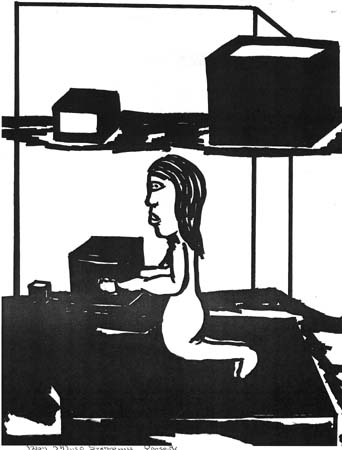
Presents, art by Edward Michael O’Durr Supranowicz
Birth PlanTom Cantwell
It was Maya who first suggested we open a bottle of wine when her contractions started. “The red,” she said. It was supposed to calm her down and loosen up her body.
|
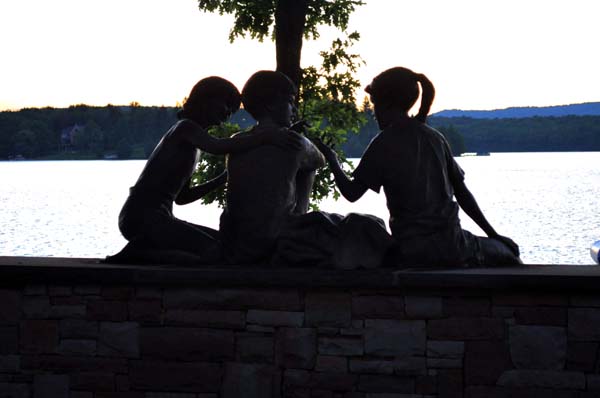
the Lake Prince, art by Peter LaBerge
Once, I Found
Ben Leib |
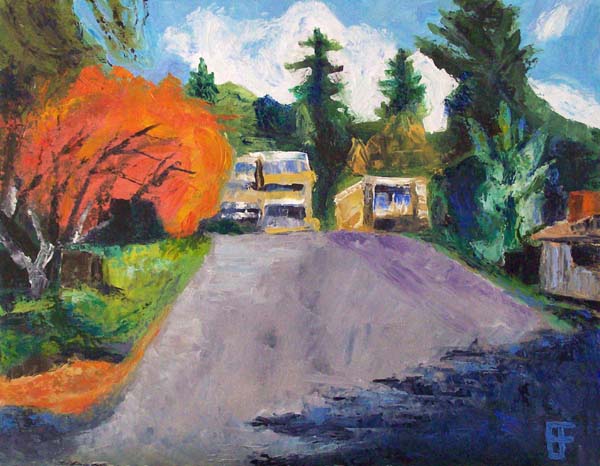
Bellevue SE 6th Stree, painting by Brian Forrest
Tracks in the Snow....Billie Louise Jones
.....Where there should be no tracks. Ever.
|
Bay to BreakersEmil DeAndreisOne year ago:
I was twenty five, and I probably wouldn’t have gone were it not for my roommate, who was appalled to learn that I had been on this earth for twenty five years and had never participated in San Francisco’s Bay to Breakers. At the time, I was an employee at the Jamba Juice on ninth and Irving, which is directly next to Golden Gate Park where a significant part of the footrace passes through. On the morning of the Bay to Breakers, I was called at seven and told my shift was cancelled, as it was foggy. Since Jamba Juice’s wellbeing depends on sunny weather, almost all of their scheduling decisions are based on weather forecasts. My manager dedicated herself religiously to Google’s weather updates to determine the amount of hours she cut everyday (which pleased the higher ups and saved her job but fucked all the lower employees that actually made the company function). She did not dedicate herself nearly enough to current events, however. Consequently, what she did not know, which was something I knew and elected not to tell her as she cancelled my shift, was that Bay to Breakers was going to bring unstoppable amounts of strange business to Jamba Juice for the entire day regardless of the exposure of sun. Not only were there going to be Willie-Nelson-looking prehistoric naked men lining out the door ordering Mango-A-Go-Gos and paying from a wallet which came from no kind of cloth pocket, but there were going to be drunken obese girls bursting from their spandex, stumbling in to heist the bathroom key and spray the bathroom walls with midday chunky Gyro vomit. Not to mention dudes who were going to come in and, at the peak of their immaculate shroom high, skid into the bathroom and manage to miss the toilet entirely with their rancid mound of human dung. Then leave. If anything, my manager should have been calling in all the forces and lining the walls of Jamba Juice with employees who were prepared for an eight hour shift on one of the most hellish customer service battlefields in America: Jamba Juice on the course of a drunken footrace in San Francisco, on a fucking Sunday. But here she was, feeling quite strategic as she looked outside at the slight 7am San Francisco fog, shed my hours, and saved her franchise sixty dollars.
(You can’t make this stuff up.)
Exactly one year after a year ago: Penelope and I took the N Judah and ambitioned to get off at Stanyan to walk right into the Panhandle and meet up with Chase. When we got to our stop, we pushed the hand rail on the sliding door, which was San Francisco Public Transit’s high-tech system for opening doors. The doors didn’t open. The train continued. At the next stop, people were interested in getting off the bus; again, the doors didn’t budge. Women started hyperventilating and clawing the sliding doors, claiming the oxygen on the train was contaminated, and limited. (You can’t make this stuff up). The train lumbered through one more stop, then inserted itself into a tunnel and when it emerged on the other side, which was about a mile from where Penelope and I had hoped to get off, the doors finally slip open. People raced off and up to the front train, where they commenced to pounding on the driver’s window and flipping him off and notifying him to prepare for lawsuits. The driver did not pay them attention; in fact he seemed to have fallen asleep during their drawn out complaint. The angry civilians began walking onto the tracks to really make a statement, but then the driver rang the bell and put his train into gear. They fled.
Penelope and I saw a couple of aspiring thugs littering trash across the street. They were smoking swishers, whistling at girls and not realizing that whistling at girls is the strongest vagina repellant there is.
Her hangover was going to be epic. Little dwarf-looking men with peace signs painted on their cheeks and beers in paper bags screamed “FIGHT! FIGHT! FUCKING KILL HIM!” Then they looked around to see if their tough, alpha-male enthusiasm was attracting any drunk women, but it wasn’t, because nothing could change the fact that they were dwarfs, and even if they wanted to, they could do no physical battling themselves, so they were left to yell “FIGHT! YEA! FUCKING KILL EACH OTHER!” with their beers and peace signs. Penelope and I watched a battle. One guy got his skull rattled by the paddled mallet side of the weapon, and then he proceeded to crumble off of the platform. All the hippies roared with approval. (You can’t make this stuff up.) We continued.
Every once in a while a sweet little dog would come up and sniff us and invite us to pamper him with light pets. The dogs squinted and had battle scars here and there, like gashes over their eyes or across their shins, and patches of hair missing. All of their eyes were bloodshot and had gook stuck to their eyelids. But they were such pretty little sweet dogs, confused by the human melee surrounding them but open to the excitement nonetheless. I loved them. That’s how I could tell that I was starting to get drunk. Beer made me love and trust animals, more than anything else. More than humans, that’s for damn sure.
Everywhere there were cowboy hats, fake mustaches, fake tits, political signs with overused and understudied statements, superhero costumes, kegs on wheels, shopping carts holding sound systems that imploded any beating heart within a thirty foot radius, Elvis impersonators, flower girls, and SPANDEX. It was a serious party.
Surrounding civilians were visually absorbing Troy and his circumcised boa constrictor. Penelope smiled for the picture. Her balloons were so big and round that they should have somehow been muscles on Troy’s body. Troy walked off and was intercepted by girls in spandex who were interested in doing photo shoots with he and the skinned gopher hanging between his legs. “Just harmless expression,” Penelope noted, then she grabbed my hand. I walked up to Chase and stole the tequila out of his hand. He watched me FUCKING CHUG it. He laughed, hysterically. Time elapsed. I was hammered, and becoming delusional, and more pissed. What void is filled for a girl by taking a picture with a man whose cock is throbbing? I wandered off for a while, with the tequila. More time elapsed. Everywhere smelled like a fart. I sat under a eucalyptus tree.
Penelope approached me with her balloons. She had a pretty smile. She reached for me. When I tried to get up, I fell. Once I was on my feet I decided it would be best to shadowbox one of her balloons, the purple one. She giggled, then I actually got a good punch off on the balloon, and it was promptly detached from its little band of tinsel that had fastened it to her wrist. The balloon was already out of reach, floating away. Penelope made a pretty little sad face. I said sorry, I think.
Suddenly, something spectacular was happening. I looked for Penelope. She was gone. Suddenly I was laughing, hysterically.
There was an actual gopher stiffly poking his head out of his tunnel, quickly, in and out, in and out. I thought of Troy. Whatever caused gophers to go to the tip of their hole, the gopher was presently feeling that urge. Humans were surrounding the gopher, attempting to lure it out, and since they were flicking shredded carrots and hot dog bun crumbs at it, the gopher felt no fear about bringing its whole body out of the hole.
“Nobody’s got a lighter? How about a matchbook? You guys are a bunch of bummers.”
|
Emil DeAndreis BioAuthor Emil DeAndreis received a degree in Creative Writing from the University of Hawaii at Hilo in 2008. Currently he is a substitute teacher and high school baseball coach in San Francisco. In his free time he plays the drums, listens to music to stay sane and wrestles with big puppies to stay young. He has had short stories and articles published in Apollo's Lyre, Conte Literary, Curbside Quotidian, FortyOunceBachelor Journal, OCHO Journal, The San Francisco Chronicle, and The Windsor Review among other publications. He has been nominated for the Pushcart prize, and recently received the Editor’s Choice Award for New Writer from Bamboo Ridge Press.
|
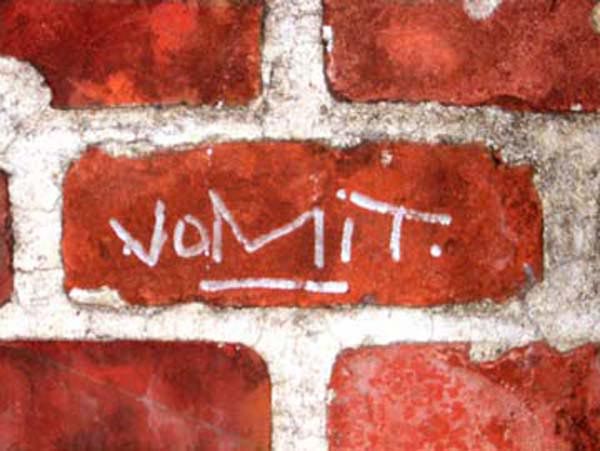
Vomit, art by Cheryl Townsend
HenryDerrick Sherwin
The town was hell on wheels, the height of the tourist season, Christmas and New Year. All the hotels, bungalow complexes and even the small Thai-style bungalows outside the small town of Lamai on the island of Koh Samui were full for the eight or nine weeks of continuous celebrations. After sunset, even the beaches began to fill up with backpackers who had been foolish enough to not plan ahead. The town was a throbbing sardine can.
“What we got to do is keep these three blokes apart. They don’t know each other so unless they meet with Dee unexpectedly, there won’t be a problem. So, we need to keep her isolated but keep each one of them on the hook separately.” “Right,” said Rob, obviously eager for news. “Did you see Dee?” “Not actually see,” said Henry.” I spoke to her on the phone. She’s still at the hospital. I don’t know when she’ll be back. There could be a complication.” “Is her friend seriously injured?” asked Rob. “Maybe I can help?” “No, no – her friend’s OK but there’s a problem about the motorbike. It belonged to Dee, you see but it wasn’t exactly legal – no papers, no insurance.” “But she’s not in serious trouble, is she? “ worried Rob anxiously. “Well, a bit early to say. They’re still trying to sort the problem out.” “I must go to her,” said Rob, “She may need my help.” “Steady on, son, steady on.” Henry put a restraining hand on the young man’s shoulder. “Nothing you can do that isn’t being done already.” “But she may need me. She may need help,” protested the distraught young man. “ She may need money!”
“She may well, indeed, later,” said Henry, the possibility of another ‘touch’ looming in his mind. “It’s good of you to offer and I’m sure she’s appreciate it later, but not now. It’s better if tourists don’t get involved with the police – better for the Thais that is. I’ll keep you in touch with what’s happening and let you know.”
“Listen,” admonished Henry,” I wish I could change places – it would be a welcome rest! I’m going through hell here trying to get you out of this mess and all you can do is moan! If you don’t behave yourself I’ll just bugger off and leave you to sort your own mess out!”
|

Cushy Shadows, art by Rose E. Grier

Debra Purdy Kong, writer, British Columbia, Canada I like the magazine a lot. I like the spacious lay-out and the different coloured pages and the variety of writer’s styles. Too many literary magazines read as if everyone graduated from the same course. We need to collect more voices like these and send them everywhere.
Children, Churches and Daddies. It speaks for itself. Write to Scars Publications to submit poetry, prose and artwork to Children, Churches and Daddies literary magazine, or to inquire about having your own chapbook, and maybe a few reviews like these.
what is veganism? A vegan (VEE-gun) is someone who does not consume any animal products. While vegetarians avoid flesh foods, vegans don’t consume dairy or egg products, as well as animal products in clothing and other sources. why veganism? This cruelty-free lifestyle provides many benefits, to animals, the environment and to ourselves. The meat and dairy industry abuses billions of animals. Animal agriculture takes an enormous toll on the land. Consumtion of animal products has been linked to heart disease, colon and breast cancer, osteoporosis, diabetes and a host of other conditions. so what is vegan action?
We can succeed in shifting agriculture away from factory farming, saving millions, or even billions of chickens, cows, pigs, sheep turkeys and other animals from cruelty. A vegan, cruelty-free lifestyle may be the most important step a person can take towards creatin a more just and compassionate society. Contact us for membership information, t-shirt sales or donations.
vegan action
Children, Churches and Daddies no longer distributes free contributor’s copies of issues. In order to receive issues of Children, Churches and Daddies, contact Janet Kuypers at the cc&d e-mail addres. Free electronic subscriptions are available via email. All you need to do is email ccandd@scars.tv... and ask to be added to the free cc+d electronic subscription mailing list. And you can still see issues every month at the Children, Churches and Daddies website, located at http://scars.tv
MIT Vegetarian Support Group (VSG)
functions: We also have a discussion group for all issues related to vegetarianism, which currently has about 150 members, many of whom are outside the Boston area. The group is focusing more toward outreach and evolving from what it has been in years past. We welcome new members, as well as the opportunity to inform people about the benefits of vegetarianism, to our health, the environment, animal welfare, and a variety of other issues.
Dusty Dog Reviews: These poems document a very complicated internal response to the feminine side of social existence. And as the book proceeds the poems become increasingly psychologically complex and, ultimately, fascinating and genuinely rewarding.
Dusty Dog Reviews: She opens with a poem of her own devising, which has that wintry atmosphere demonstrated in the movie version of Boris Pasternak’s Doctor Zhivago. The atmosphere of wintry white and cold, gloriously murderous cold, stark raging cold, numbing and brutalizing cold, appears almost as a character who announces to his audience, “Wisdom occurs only after a laboriously magnificent disappointment.” Alas, that our Dusty Dog for mat cannot do justice to Ms. Kuypers’ very personal layering of her poem across the page.
Fithian Press, Santa Barbara, CA Indeed, there’s a healthy balance here between wit and dark vision, romance and reality, just as there’s a good balance between words and graphics. The work shows brave self-exploration, and serves as a reminder of mortality and the fragile beauty of friendship.
Mark Blickley, writer You Have to be Published to be Appreciated. Do you want to be heard? Contact Children, Churches and Daddies about book or chapbook publishing. These reviews can be yours. Scars Publications, attention J. Kuypers. We’re only an e-mail away. Write to us.
The Center for Renewable Energy and Sustainable Technology The Solar Energy Research & Education Foundation (SEREF), a non-profit organization based in Washington, D.C., established on Earth Day 1993 the Center for Renewable Energy and Sustainable Technology (CREST) as its central project. CREST’s three principal projects are to provide: * on-site training and education workshops on the sustainable development interconnections of energy, economics and environment; * on-line distance learning/training resources on CREST’s SOLSTICE computer, available from 144 countries through email and the Internet; * on-disc training and educational resources through the use of interactive multimedia applications on CD-ROM computer discs - showcasing current achievements and future opportunities in sustainable energy development. The CREST staff also does “on the road” presentations, demonstrations, and workshops showcasing its activities and available resources. For More Information Please Contact: Deborah Anderson dja@crest.org or (202) 289-0061
Dorrance Publishing Co., Pittsburgh, PA want a review like this? contact scars about getting your own book published.
 The magazine Children Churches and Daddies is Copyright © 1993 through 2012 Scars Publications and Design. The rights of the individual pieces remain with the authors. No material may be reprinted without express permission from the author. 
Okay, nilla wafer. Listen up and listen good. How to save your life. Submit, or I’ll have to kill you.
Dorrance Publishing Co., Pittsburgh, PA: “Hope Chest in the Attic” captures the complexity of human nature and reveals startling yet profound discernments about the travesties that surge through the course of life. This collection of poetry, prose and artwork reflects sensitivity toward feminist issues concerning abuse, sexism and equality. It also probes the emotional torrent that people may experience as a reaction to the delicate topics of death, love and family. “Chain Smoking” depicts the emotional distress that afflicted a friend while he struggled to clarify his sexual ambiguity. Not only does this thought-provoking profile address the plight that homosexuals face in a homophobic society, it also characterizes the essence of friendship. “The room of the rape” is a passionate representation of the suffering rape victims experience. Vivid descriptions, rich symbolism, and candid expressions paint a shocking portrait of victory over the gripping fear that consumes the soul after a painful exploitation.
Dusty Dog Reviews (on Without You): She open with a poem of her own devising, which has that wintry atmosphere demonstrated in the movie version of Boris Pasternak’s Doctor Zhivago. The atmosphere of wintry white and cold, gloriously murderous cold, stark raging cold, numbing and brutalizing cold, appears almost as a character who announces to his audience, “Wisdom occurs only after a laboriously magnificent disappointment.” Alas, that our Dusty Dog for mat cannot do justice to Ms. Kuypers’ very personal layering of her poem across the page.
|